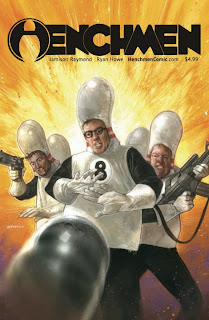The fruit of a successful Kickstarter, Henchmen, the debut series from new publishing banner Robot Paper, is the story of Gary, former office supply salesman and former husband, who tries out a new career: henching. In many ways, Henchmen is a classic superhero comic. It features an epic confrontation between bowling ball-based superhero Striker and bowling pin-based supervillain Head Pin-- the twist being that creators Jamison Raymond and Ryan Howe spotlight the henchmen rather than their super-counterparts. It's spandex and explosions, but it's a meditation on feeling expendable and lost. The fact that this particular villain dresses his underlings (and by extension, Gary) up as paper mâché bowling pins - the purpose of which are to be set up specifically to be knocked back down - is an efficient way of hammering the point home. For those already sold on the comic, turn back now-- thar be spoilers ahead.
Efficient is a good way to describe Raymond's writing on the whole. Henchmen's narrative is deft and agile, confronting Gary's depression, failed marriage, lost job and attempted suicide in the opening pages, all with a swift pace and a lightness. Don't expect Watchmen levels of weight. We as readers partake in Gary's sadness, but the comic doesn't dwell on it. In the hospital after his Tylenol overdose, the doctor informs Gary that he is in liver failure and can no longer drink alcohol, to which he replies, "I don't drink. I only do over-the-counter painkillers." Offering a quiet, "Heh..." to his physician's stony glare.
These tragic moments are covered so early and so quickly because while Henchmen is a story about feeling expendable, it is also about finding your place once more. In a way that is not unlike a melding of Office Space and The Monarch and his dubious henchmen from The Venture Bros., Gary discovers that corporate incompetence extends outside of the office. As Striker and Head Pin exchange incorrect puns in a battle of (dim) wits, Gary remarks "Different job. Same idiot boss." It's succinct and efficient, yes, but it's about as sharp and fresh as a Dilbert strip.
Taking his life into his own hands, Gary convinces a small group of henchmen to follow him instead, escaping with the money. Once again, in a way that is not unlike Office Space, or almost every movie you've ever seen, Gary's sudden streak of leadership and out-of-the-box thinking saves his bacon. His depression is cured, his broken marriage begins to suck less, and his heroics gain him the respect of the local henchmen. The sequel hook comes when Gary, having a drink at the bar with his fellow hench-buds, reacts to a news story that Japan will begin manufacturing Henchbots, threatening the job security of henchmen everywhere, by suggesting they start a union. Naturally, the organization of which quickly becomes Gary's job.
The story is a tight, quick package, which is simultaneously its strength and its weakness. It's a fast, pleasant read, uninhibited by any pretensions, but as a comic and a story is breaks close to no new ground. Even the hench twist has been done before. Readers looking for an enjoyable read will find it here, but don't expect to be wowed.
I'd say the same thing about the art, too. It's competent and unobstructive to the reading experience. The backgrounds are simple, or flat, and the line work is clean-- though in the coloring process, the whites of a few dozen eyes were sacrificed. There's a page that sticks out to me, however, when Head Pin is revealed for the first time. The panel takes up two-thirds of a page, and while Head Pin himself is very detailed and well-shaded, he's up against a flat purple gradient. It's the second-largest panel in the book, and most of its negative space is a flat purple gradient. If there's anything about the art I'd consider a misstep, it's the lack of background details in featured panels. I get that this is a two-man operation on a shoestring budget, but I hope, going forward, that a little more effort can be squeezed in where it counts.
Overall, Henchmen is a solid debut, and while I don't think the story is the funkiest of funky-fresh, the notion of organizing a union of henchmen has juice. It occupies an odd liminal space in Comicdom, though. It may be too 'literary' to appeal to the mainstream comic reader, and it may be too quick, too simple, too well-tread for the more stuffy graphic novel reader (me). I'm intrigued about the future of the series, but I'm not sold on buying issue two just yet. If I had to rank Henchmen using the score from a bowling frame, I'd give it a 7-10 split. Unpack that as you will.








0 comments: